HDPE CNC Machining Services
HDPE, short for High-Density Polyethylene, is a type of engineering plastic that is widely used in the packaging industry. CNC machining in HDPE can be utilized to create parts for the automotive, construction, electrical sectors, and many more. Runsom Precision is an experienced plastic machining specialist that can turn your concepts into functional components at fast turnarounds. We work with HDPE and other plastics, precisely following our clients' specifications and drawings. Our top-of-the-line machining center and skilled engineers have produced thousands of machined HDPE parts for global customers.
CNC Machining in HDPE
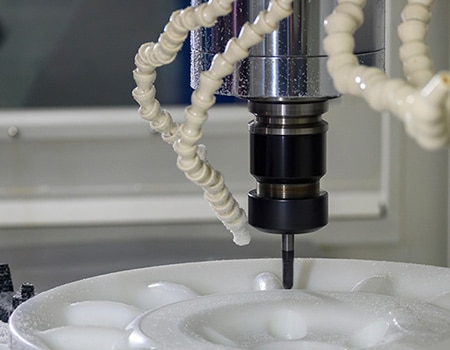
Thermoplastic HDPE is an ideal material for CNC machining, owing to its high machinability, rigidity, and low moisture absorption. Additionally, it is available in FDA-compliant and USDA-certified grades, making it a suitable choice for applications in the food, medical, beverage, and sanitary industries, as well as in marine applications.
The CNC machining of HDPE process involves computerized instructions that direct manufacturing equipment to remove raw material and shape the part. The computer controls machines such as lathes, mills, routers, and grinders to perform three-dimensional cutting tasks using a single set of prompts.
HDPE CNC Machining Specification
Application
Packaging, electrical insulator, containers, piping, plugs and seals, conveyor screws.
Tolerances
It is determined by the desired effect and the HDPE type used. A tolerance of ±0.005” (±0.13 mm) is available at Runsom.
Advantages
High strength-to-density ratio, good resistance to chemical & moisture, FDA-compliant for food storage.
Wall Thickness
It is mostly decided by the HDPE type and part geometry. A minimum wall thickness of ±0.03” (±0.8 mm) is available at Runsom.
Lead Time
As fast as 3 days, but it will be finally determined by part complexity and order quantity.
Max Part Size
The available size is mostly determined by the machine and part geometry.
Processes
3-axis & 5-axis CNC milling.
Finishes
As Machined.
Benefits of Using HDPE for CNC Machining
There are many advantages to utilizing HDPE for CNC machining:
1. High rigidity and stability
Due to its high melting point, HDPE is able to maintain its stiffness at very high temperatures, making it a popular material choice for a wide range of products, such as cutting boards, food storage containers, milk jugs, plastic timber, detergent bottles, and corrosion-resistant pipes. It can be shaped into an endless variety of items upon reaching its melting point.
2. Great corrosion resistance and durability
HDPE is an ideal material for underground piping because it is resistant to environmental factors and does not foster the growth of mold or mildew. Additionally, it’s well suited for food and beverage containers due to its durability, ability to withstand exposure to external conditions, and ease of sanitization through boiling.
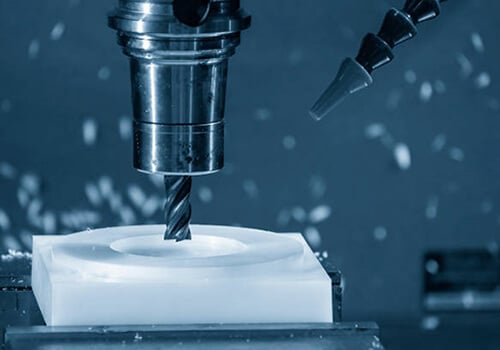
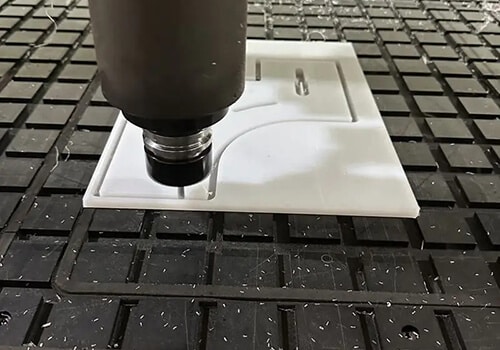
3. High strength-to-density ratio
The density of HDPE falls between 0.93 and 0.97 g/cm3, which is marginally higher than that of LDPE. However, HDPE's structure is linear, lacking any branching, which consequently results in stronger intermolecular forces and tensile strength when viewed through a microscope, as compared to LDPE.
4. Recyclable
When choosing a material, it is important to factor in the availability of plastic recycling programs since plastic is commonly used in our daily lives. Fortunately, HDPE plastic is easily recyclable, which helps reduce non-biodegradable waste in landfills and decreases plastic production by up to 50%.
Properties of High-density Polyethylene (HDPE)
HDPE is a type of thermoplastic that has a highly crystalline structure, is moderately stiff, and has a high density. It is also known for its tensile strength.
Ultimate tensile strength
(MPa)
22.1 - 31
Yield strength
(MPa)
26.2 - 31
Young's modulus
(modulus of elasticity)
(GPa)
1.07 - 1.09
Elongation at Break
(%)
500 - 700
Hardness
(HV)
7.9 - 9.9
Surface Finishes for CNC Machined HDPE Parts
HDPE is similar to other plastics in the PE group as it is highly resistant to coatings. It also resists adhesives, requiring plastic welding for bonding. Typically, HDPE comes in black or white, occasionally in other colors. As a result of these properties, HDPE components are generally not requiring further processing but left in their machined condition.
As machined: The challenges faced in the CNC machining of HDPE are similar to those encountered while processing other types of engineering plastics. The machined surface of HDPE has a dull appearance with a matte finish.
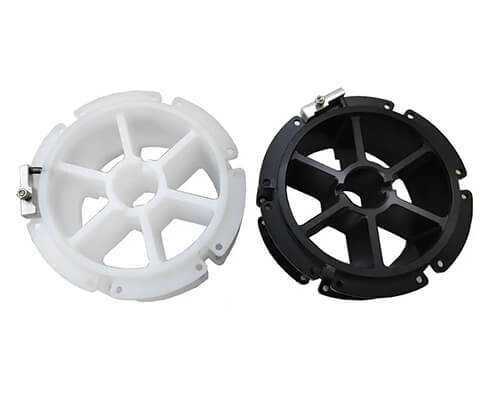
Considerations for HDPE CNC Machining
Although HDPE is commonly utilized in CNC machining, it can present difficulties in machining if the processing conditions are incorrect. To effectively machine HDPE, certain factors must be taken into account:
1. Internal stress: When working with HDPE, the heat created during cutting can lead to material cracking and internal stress. This issue is more common when the material is cold. To avoid these problems, annealing the HDPE before routing and milling operations can be helpful.
2. Cutting chips: In the process of machining, the machinery may get clogged due to the chips produced by cutting the workpiece. To avoid this, the use of compressed air & vacuum systems can effectively clear the chips and ensure high precision, smooth surface quality while also reducing the presence of dust and debris.
3. Machining speed: To route or mill HDPE successfully, it is essential to have high processing speeds.
Types of HDPE Materials
HDPE Matte Sheet
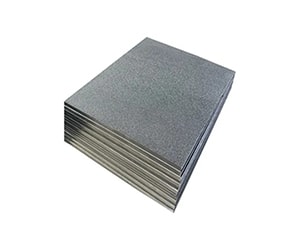 If you're looking for long-lasting and robust material, then HDPE matte sheets are your best option. Not only is it lightweight, but it is also resistant to both moisture and sunlight. Many products, including cutting boards, are made from HDPE matte sheets.
If you're looking for long-lasting and robust material, then HDPE matte sheets are your best option. Not only is it lightweight, but it is also resistant to both moisture and sunlight. Many products, including cutting boards, are made from HDPE matte sheets.
HDPE Smooth Sheet
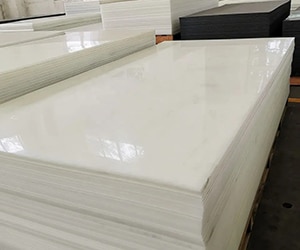 When it comes to strength, HDPE smooth sheet is an excellent choice. It has exceptional impact strength and is resistant to chemicals, corrosion, and harsh weather conditions. You can find HDPE smooth sheets in a vast range of applications, including mechanical parts, piping systems, folding chairs, fuel tanks, and even frozen food molds.
When it comes to strength, HDPE smooth sheet is an excellent choice. It has exceptional impact strength and is resistant to chemicals, corrosion, and harsh weather conditions. You can find HDPE smooth sheets in a vast range of applications, including mechanical parts, piping systems, folding chairs, fuel tanks, and even frozen food molds.
HDPE Pipe Grade
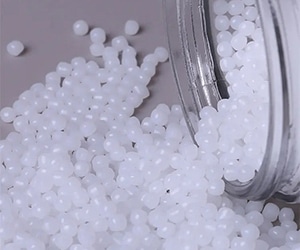 The HDPE pipe grade is a great choice for applications that require resistance against chemicals and UV. With its reliable performance, it also offers resistance to stress cracks, making it ideal for both outdoor and industrial uses.
The HDPE pipe grade is a great choice for applications that require resistance against chemicals and UV. With its reliable performance, it also offers resistance to stress cracks, making it ideal for both outdoor and industrial uses.
HDPE Antiskid
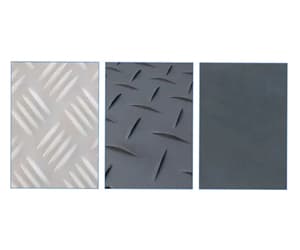 HDPE antiskid is a sturdy material that doesn't become slippery even when subjected to wet. It is a lightweight product that can resist rotting and mold, while also withstanding impact and exposure to weather. Plus, it is a recyclable material that's perfect for a range of outdoor and marine applications.
HDPE antiskid is a sturdy material that doesn't become slippery even when subjected to wet. It is a lightweight product that can resist rotting and mold, while also withstanding impact and exposure to weather. Plus, it is a recyclable material that's perfect for a range of outdoor and marine applications.
HDPE ColorCore®
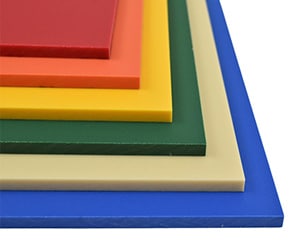 HDPE ColorCore® possesses exceptional resistance to chemicals and impact. It is also highly durable, resistant to warping, rotting, and abrasion, ideal for applications like marine, recreation, and signs as well.
HDPE ColorCore® possesses exceptional resistance to chemicals and impact. It is also highly durable, resistant to warping, rotting, and abrasion, ideal for applications like marine, recreation, and signs as well.
Why Choose Runsom HDPE Machining Services?
At Runsom Precision, we specialize in both the CNC machining and assembly of HDPE parts and components. By utilizing a combination of standard hardware and custom-machined components, we can create high-quality products specific to your needs. With our expertise in assembling complex components, we can fulfill the demands of various industries, including aerospace, marine, and medical. Our team will always work with you to make your custom machined HDPE projects a reality.
Machining HDPE FAQs
It is possible to use CNC to machine HDPE. This type of plastic is moisture and chemical-proof, with a slippery texture.
Typically, HDPE is fabricated into plugs and seals due to its low-friction properties and insulating abilities. It has a waxy finish that is perfect for certain applications.
Some advantages of HDPE include its chemical resistance and ability to withstand low temperatures well. Additionally, it is a durable and stiff material that is reasonably priced.
HDPE is susceptible to stress cracking and has a higher mold shrinkage. Additionally, it has less stiffness than polypropylene.
